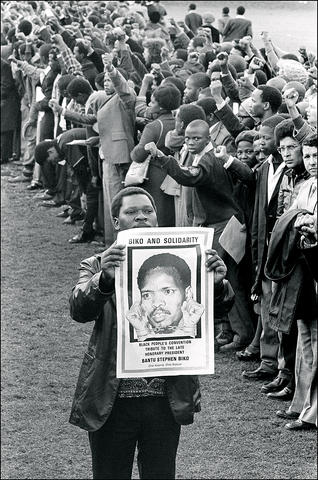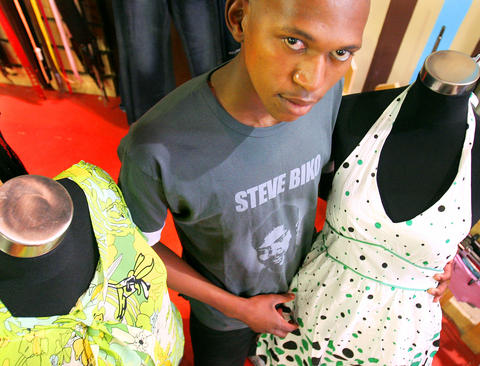T-shirts bearing the image of Steve Biko, the worldwide symbol of black resistance who was killed by apartheid police, can be found for sale at flea market stalls and exclusive boutiques across South Africa.
The question is whether the latest fashion is a sign the post-apartheid youth culture is embracing Biko's message of racial pride and African unity, or just crass commercialization of one of the most important figures in South African history.
Biko died of a brain injury in a cell in Pretoria Central Prison on Sept. 12, 1977, after being beaten and tortured by apartheid police. The 30th anniversary of his death was to be commemorated in South Africa this week with events that include a speech by President Thabo Mbeki.

PHOTO: AFP
At 22, Kenneth Mulaudzi was born after Biko's death, and was still a boy when apartheid ended in 1994. In a trendy Johannesburg store over the weekend, Mulaudzi eyed a US$28 T-shirt bearing Biko's image, the bearded face dominated by eyes under a wide brow.
"It's not just a fashion statement. It is also a political statement," Mulaudzi said defiantly. "Young people are proud of him. He is a hero. He fought for us."
Mulaudzi, an aspiring journalist with a stud in his chin, knew quite a bit about Biko, but hasn't read I Write What I Like, Biko's seminal collection of essays.

PHOTO: AFP
He does have a poster of Biko in his home and can sing the lyrics to Haitian-American rapper Wyclef Jean's song Diallo which draws parallels between the 1999 shooting of an African immigrant by New York police and the murder of the South African activist.
"I was surprised when I heard that song. It means Biko has gone far," Mulaudzi said, adding that he thinks it is the disturbing nature of the activist's death that affected so many.
Biko's message of black pride appealed to many people in South Africa's townships. His death made him a martyr in the anti-apartheid movement and inspired films such as Cry Freedom, starring Denzel Washington and British musician Peter Gabriel's anthem Biko.
The end of white rule in 1994 saw Biko's appeal wane as South Africa's black majority reveled in new political and economic freedoms. The black consciousness movement in South Africa is in disarray and a recent wave of defections has decimated its main political party, the Pan African Congress.
However, today there is a growing disenchantment among young people who see the country's leaders embroiled in scandal and a new black elite growing richer while most blacks find it harder and harder to keep up with inflation.
Some observers see a stronger black consciousness message emerging in popular culture as young people develop their own sense of what it means to be African in today's world. A look around Sowearto, the Afro-chic store where Mulaudzi was browsing, supports that argument.
Dresses and tops celebrate singer Miriam Makeba as a "Great African" and carry the slogans of the black pride movement such as "The color of my skin is beautiful" and "Africa Must Unite."
Jackie Radebe, 23, bought a Biko T-shirt after reading I Write What I Like. He sees Biko as a selfless leader whose politics of brotherhood are still relevant to South Africa.
"He had genuine compassion for the plight of the people, genuine concern about poverty, crime and loss of pride," Radebe said.
While Biko would celebrate the "breakthroughs this young democracy has achieved," Radebe believes his hero would be disappointed in the country's leaders.
"As far as morals, integrity and principles ... contemporary political leaders seem to be driven by money and self-interest," he says.
Radebe hangs out at the African-focused Xarra Books in Johannesburg's Newtown Cultural Precinct.
June Josephs-Langa, managing director of the African-focused Xarra, says South Africa's younger generation is more assertive and "proudly African."
The ones wearing Biko T-shirts may not all be like Radebe, but they are making a statement, she says.
"In the same way many don't know much about Cuban politics, the revolutionary status of Che Guevara is someone they want to identify with, want to parade," she said.
But Johannesburg-based academic and cultural commentator Achille Mbembe, who is delivering a lecture in Biko's honor this week, doesn't see fashion as a fitting tribute to a man whose "death and life dramatically embodies the idea of freedom."
"I think South Africa could commemorate Biko's contribution to black emancipation in more powerful ways," he says.
Nkosinathi Biko, who was six when his father died, takes a more reconciliatory tone.
He points to the tradition in the anti-apartheid movement of using T-shirts to spread political messages or pay tribute to fallen comrades.
He also acknowledges that the wealth of artistic material created in his father's name has been important in keeping the memory of Biko alive.
"He is one of the attractive symbols of popular culture. Not just here but on the streets of New York, Brasilia and Liverpool, he is someone who resonates well," he says.
However, as head of the Steve Biko Foundation, he is mindful of ensuring his father's name and image are not abused.
The foundation has been running a nationwide commemorative program this year that includes a young-writers competition whose sponsors include the Biko Foundation and Xarra bookstore, films festivals and music concerts.
Biko spoke of a time when Africans could stand proud and take their place in a society that transcended race and was based on equality.
Quoting his father, Nkosinathi Biko says this "glittering prize" was still on "the distant horizon" for South Africa.
Perhaps those young people wearing the hero's face on their chests will be inspired to find it.

US President Donald Trump may have hoped for an impromptu talk with his old friend Kim Jong-un during a recent trip to Asia, but analysts say the increasingly emboldened North Korean despot had few good reasons to join the photo-op. Trump sent repeated overtures to Kim during his barnstorming tour of Asia, saying he was “100 percent” open to a meeting and even bucking decades of US policy by conceding that North Korea was “sort of a nuclear power.” But Pyongyang kept mum on the invitation, instead firing off missiles and sending its foreign minister to Russia and Belarus, with whom it

When Taiwan was battered by storms this summer, the only crumb of comfort I could take was knowing that some advice I’d drafted several weeks earlier had been correct. Regarding the Southern Cross-Island Highway (南橫公路), a spectacular high-elevation route connecting Taiwan’s southwest with the country’s southeast, I’d written: “The precarious existence of this road cannot be overstated; those hoping to drive or ride all the way across should have a backup plan.” As this article was going to press, the middle section of the highway, between Meishankou (梅山口) in Kaohsiung and Siangyang (向陽) in Taitung County, was still closed to outsiders

Many people noticed the flood of pro-China propaganda across a number of venues in recent weeks that looks like a coordinated assault on US Taiwan policy. It does look like an effort intended to influence the US before the meeting between US President Donald Trump and Chinese dictator Xi Jinping (習近平) over the weekend. Jennifer Kavanagh’s piece in the New York Times in September appears to be the opening strike of the current campaign. She followed up last week in the Lowy Interpreter, blaming the US for causing the PRC to escalate in the Philippines and Taiwan, saying that as

The Chinese Communist Party (CCP) has a dystopian, radical and dangerous conception of itself. Few are aware of this very fundamental difference between how they view power and how the rest of the world does. Even those of us who have lived in China sometimes fall back into the trap of viewing it through the lens of the power relationships common throughout the rest of the world, instead of understanding the CCP as it conceives of itself. Broadly speaking, the concepts of the people, race, culture, civilization, nation, government and religion are separate, though often overlapping and intertwined. A government